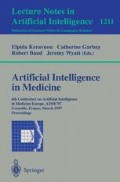Abstract
In this paper, medical diagnosis is viewed as a two-stage process: medical knowledge is first interpreted in a diagnostic sense; next, observed findings are interpreted with respect to this interpreted knowledge and a given hypothesis, yielding a diagnosis. A new set-theoretical framework is introduced that captures this view of diagnosis; it is used to formalize various notions of diagnosis, those proposed in the literature included. Next, a new theory of flexible diagnosis, called refinement diagnosis, is proposed and defined in terms of this framework. Relationships with notions of diagnosis known from the literature are investigated.
Preview
Unable to display preview. Download preview PDF.
References
B.G. Buchanan and E.H. Shortliffe (1984). Rule-based Expert Systems: the MYCIN Experiments of the Stanford Heuristic Programming Project. Reading: Addison-Wesley.
T. Bylander, D. Allemang, M.C. Tanner and J.R. Josephson (1992). The computational complexity of abduction. Artificial Intelligence, 49, 25–60.
W.J. Clancey (1985). Heuristic classification. Artificial Intelligence, 27, 289–350.
L. Console, D. Theseider Dupré and P. Torasso (1989). A theory of diagnosis for incomplete causal models. In Proceedings of the 10th International Joint Conference on Artificial Intelligence, pp. 1311–1317.
L. Console and P. Torasso (1990). Integrating models of correct behaviour into abductive diagnosis. In Proceedings of EGAI'90, pp. 160–166.
K.L. Downing (1993). Physiological applications of consistency-based diagnosis. Artificial Intelligence in Medicine, 5, 9–30.
J. de Kleer, A.K. Mackworth and R. Reiter (1992). Characterizing diagnoses and systems. Artificial Intelligence, 52, 197–222.
P.J.F. Lucas (1996). Modelling interactions for diagnosis. In Proceedings of CESA'96 IMACS Multiconference: Modelling, Analysis and Simulation, 1, pp. 541–546, Lille, France.
Y. Peng and J.A. Reggia (1990). Abductive inference models for diagnostic problem solving. New York: Springer-Verlag.
D. Poole (1990). A methodology for using a default and abductive reasoning system. International Journal of Intelligent Systems, 5(5), 521–548.
W.F. Punch III, M.C. Tanner, J.R. Josephson and J.W. Smith (1990). PEIRCE: a tool for experimenting with abduction. IEEE Expert, 5(5), 34–44.
R. Reiter (1987). A theory of diagnosis from first principles. Artificial Intelligence, 32, 57–95.
S. Tuhrim, J. Reggia and S. Goodall (1991). An experimental study of criteria for hypothesis plausibility. Journal of Experimental and Theoretical Artificial Intelligence, 3, 129–144.
T.D. Wu (1991). A problem decomposition method for efficient diagnosis and interpretation of multiple disorders. Computer Methods and Programs in Biomedicine, 35, 239–250.
Author information
Authors and Affiliations
Editor information
Rights and permissions
Copyright information
© 1997 Springer-Verlag Berlin Heidelberg
About this paper
Cite this paper
Lucas, P. (1997). A theory of medical diagnosis as hypothesis refinement. In: Keravnou, E., Garbay, C., Baud, R., Wyatt, J. (eds) Artificial Intelligence in Medicine. AIME 1997. Lecture Notes in Computer Science, vol 1211. Springer, Berlin, Heidelberg. https://doi.org/10.1007/BFb0029449
Download citation
DOI: https://doi.org/10.1007/BFb0029449
Published:
Publisher Name: Springer, Berlin, Heidelberg
Print ISBN: 978-3-540-62709-8
Online ISBN: 978-3-540-68448-0
eBook Packages: Springer Book Archive

